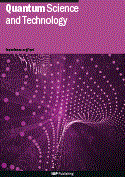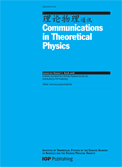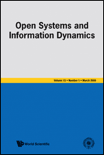
ACM Transactions on Quantum Computing
Scope & Guideline
Empowering the Next Generation of Quantum Thinkers
Introduction
Aims and Scopes
- Quantum Algorithms:
Research focused on developing new quantum algorithms that leverage quantum mechanics to solve problems more efficiently than classical algorithms. - Quantum Circuit Design and Optimization:
Studies that aim to refine the design and optimization of quantum circuits, including fault tolerance, gate synthesis, and circuit mapping. - Quantum Machine Learning:
Exploration of the intersection between quantum computing and machine learning, investigating how quantum methods can enhance learning algorithms. - Quantum Information Theory:
Research into the principles of quantum information, including quantum communication protocols, error correction, and cryptographic applications. - Hybrid Quantum-Classical Systems:
Development of frameworks and algorithms that integrate classical computing resources with quantum systems to solve complex problems. - Quantum Hardware and Architectures:
Investigation of physical implementations of quantum computing, including architecture design, qubit technologies, and scalability challenges.
Trending and Emerging
- Optimization Techniques for Quantum Circuits:
A significant trend has emerged focusing on optimization strategies for quantum circuits, reflecting the need for efficient implementations in real-world applications. - Machine Learning Applications in Quantum Computing:
The integration of machine learning techniques into quantum computing research is on the rise, showcasing the potential for quantum-enhanced learning algorithms. - Hybrid Quantum-Classical Algorithms:
There is an increasing focus on hybrid approaches that combine quantum and classical computing, particularly in solving complex optimization problems. - Quantum Sensor Networks:
Recent interest in quantum sensors indicates a growing recognition of their potential applications in various fields, including metrology and communications. - Formal Verification of Quantum Programs:
As quantum programming becomes more complex, there is a notable increase in research aimed at formal verification methods to ensure the reliability of quantum software.
Declining or Waning
- Basic Quantum Theory:
Research papers focusing on foundational aspects of quantum mechanics have decreased, possibly as the field moves toward more application-driven studies. - Quantum Communication Protocols:
While still relevant, there appears to be a waning interest in traditional quantum communication protocols as newer, more integrated approaches are explored. - Theoretical Quantum Complexity:
Theoretical discussions around quantum complexity theory have become less prominent, as practical applications and implementations take precedence. - Quantum Error Correction Techniques:
Although still crucial, the frequency of novel contributions in traditional quantum error correction methods has declined, following extensive foundational work in earlier years. - Quantum Simulation of Basic Systems:
Research focused on simulating simple quantum systems has decreased, with a shift towards more complex and practical applications in quantum computing.
Similar Journals

Quantum Science and Technology
Driving Excellence in Quantum Research and ApplicationsQuantum Science and Technology is an esteemed academic journal published by IOP Publishing Ltd, specializing in the cutting-edge fields of quantum physics and technology. With a strong emphasis on innovation, the journal serves as a vital platform for researchers, professionals, and students engaged in Atomic and Molecular Physics, Electrical Engineering, and Materials Science. Since its inception in 2016, the journal has rapidly ascended to prominence, achieving Q1 rankings across multiple categories in 2023, reflecting its high impact and influence in the global scientific community. The journal is recognized for its rigorous peer-review process and commitment to disseminating groundbreaking research that pushes the frontiers of quantum science. Although it is currently not open access, the journal remains a pivotal resource for those seeking to stay at the forefront of developments in quantum technology and its applications. As part of its objectives, Quantum Science and Technology aims to connect diverse scholarly perspectives, fostering collaboration and knowledge exchange that can drive forward the quantum field.

AVS Quantum Science
Illuminating the Path of Quantum AdvancementAVS Quantum Science, published by AIP Publishing, is a premier open-access journal dedicated to the interdisciplinary realm of quantum science, encompassing advancements in atomic and molecular physics, computational theory, and materials science. With an impressive array of contributions from researchers worldwide, this journal has achieved a remarkable status in the academic community, proudly holding a Q1 category ranking across multiple fields including Condensed Matter Physics and Electrical and Electronic Engineering as of 2023. As an essential resource for scholars, practitioners, and students, AVS Quantum Science emphasizes the critical importance of quantum phenomena in shaping future technologies and methodologies. The journal's commitment to rigorous peer review and dissemination of groundbreaking research serves as a pivotal platform for innovation, revealing new insights and fostering collaboration in the evolving landscape of quantum science.

Advanced Quantum Technologies
Leading the Charge in Quantum Technology AdvancementsAdvanced Quantum Technologies is a leading journal published by WILEY, specializing in the rapidly evolving fields of quantum mechanics and technology. With an impact factor reflecting its rigorous peer-review process and high-quality research, this journal aims to disseminate the latest advancements across multiple disciplines, including Computational Theory and Mathematics, Condensed Matter Physics, and Electrical and Electronic Engineering. Since its inception in 2018, it has garnered a prominent reputation, as evidenced by its Q1 ranking in several categories for 2023 and its high percentiles in Scopus rankings, showcasing its significant contributions to the academic community. Researchers and professionals alike will find valuable insights within its pages, promoting innovations that bridge theoretical frameworks and practical applications. Although currently not an Open Access journal, Advanced Quantum Technologies continues to strive for excellence, ensuring that its content is accessible and impactful to those who are shaping the future of quantum technologies.

COMMUNICATIONS IN THEORETICAL PHYSICS
Unraveling the complexities of the cosmos.COMMUNICATIONS IN THEORETICAL PHYSICS is a distinguished journal published by IOP Publishing Ltd, focusing on the broad and evolving field of theoretical physics. With an ISSN of 0253-6102 and an E-ISSN of 1572-9494, this journal provides a platform for the dissemination of innovative research that contributes to the understanding of complex physical concepts. Situated in the United Kingdom, it has established itself as a pivotal resource from 1996 to 2024, achieving a commendable Q2 ranking in the category of Physics and Astronomy (miscellaneous) for 2023. With a Scopus ranking of #18 out of 81 in its category, demonstrating a 78th percentile, this journal plays a crucial role in enhancing scholarly communication among researchers, professionals, and students alike. Although it does not currently offer Open Access options, the journal's comprehensive scope and commitment to high-quality peer-reviewed research underline its significance in the scientific community, making it an essential reading for anyone engaged in theoretical physics.

OPEN SYSTEMS & INFORMATION DYNAMICS
Unleashing Knowledge for Collaborative Scientific Discovery.OPEN SYSTEMS & INFORMATION DYNAMICS, published by World Scientific Publishing Co Pte Ltd, is a leading international journal dedicated to advancing research in the interdisciplinary areas of computational mechanics, information systems, and mathematical physics. With its ISSN 1230-1612 and E-ISSN 1793-7191, the journal has established itself as an influential platform for disseminating original research findings, reviews, and methodologies that address complex systems and dynamics. Its current impact factor reflects a solid reputation within the academic community, particularly amongst researchers in the fields of physics, statistics, and computational sciences. The journal's scope encompasses a diverse array of subjects, earning a Q2 classification in Computational Mechanics and Q3 in multiple other categories, including Fluid Flow and Transfer Processes and Information Systems. By providing open access to a wealth of knowledge, OPEN SYSTEMS & INFORMATION DYNAMICS is committed to fostering collaboration and innovation for students, researchers, and industry professionals alike, positioning itself as a cornerstone of scientific exploration and discovery in Singapore and beyond.

npj Quantum Information
Elevating the discourse in quantum information science.npj Quantum Information is a premier open-access journal published by NATURE PORTFOLIO, focusing on advancing the interdisciplinary field of quantum information science. First launched in 2015, the journal has rapidly established itself as a leading platform for innovative research, reflected in its impressive Q1 category rankings across multiple fields, including Computational Theory and Mathematics, Computer Networks and Communications, and Statistical and Nonlinear Physics. With an emphasis on publishing high-quality research, npj Quantum Information aims to disseminate pivotal findings that shape the future of quantum technologies and their applications. Its open-access model further enhances the accessibility of cutting-edge scholarly work, fostering collaboration and knowledge sharing among researchers, professionals, and students worldwide. With its commitment to excellence, the journal plays a crucial role in the intellectual landscape of quantum science, inviting contributions that push the boundaries of understanding and innovation.

EPJ Quantum Technology
Illuminating the Path of Quantum Technology AdvancementEPJ Quantum Technology is a prestigious open-access journal published by Springer, dedicated to advancing the fields of Quantum Technology, with a focus on areas such as atomic and molecular physics, condensed matter physics, and control engineering. Launched in 2014, this journal has quickly established itself as an influential platform for scholars and practitioners, achieving a remarkable Q1 ranking across multiple categories in 2023, indicative of its high impact and relevance in the scientific community. With an impressive Scopus ranking that places it in the top 15% for condensed matter physics and the top 20% for electrical and electronic engineering, EPJ Quantum Technology serves as a vital resource for researchers aiming to explore groundbreaking technologies and foster interdisciplinary collaboration. By providing unrestricted access to cutting-edge research, it plays a crucial role in disseminating knowledge that drives innovation and enhances understanding in this rapidly evolving field. Based in Germany and reaching an international audience, it is poised to impact the future of quantum science and technology significantly.

INTERNATIONAL JOURNAL OF THEORETICAL PHYSICS
Fostering Innovation in Theoretical PhysicsInternational Journal of Theoretical Physics is a premier academic journal dedicated to the advancement of knowledge in the fields of theoretical physics and mathematics. Published by Springer/Plenum Publishers, this esteemed journal has been a vital platform for researchers since its inception in 1968. With an impressive track record and an emphasis on high-quality, innovative research, the journal currently ranks in the third quartile (Q3) in both the Mathematics (Miscellaneous) and Physics and Astronomy (Miscellaneous) categories as of 2023. While the journal is not open access, it offers accessible subscription options for institutions and individuals. The International Journal of Theoretical Physics serves as an essential resource for scholars and practitioners looking to deepen their understanding and contribute to the evolving landscape of theoretical research, making it a key player in nurturing academic discourse and fostering collaboration in its field.

Theory of Computing
Elevating Theoretical Insights in Computer ScienceTheory of Computing, published by the University of Chicago, Department of Computer Science, is a prestigious journal that has established itself as a leading platform in the fields of Computational Theory and Theoretical Computer Science. With its ISSN 1557-2862, the journal has earned a reputation for high-quality, peer-reviewed research, positioning itself in the Q1 quartile for both Computational Theory and Mathematics, as well as Theoretical Computer Science as of 2023. Despite its limited open access options, the journal remains a vital resource for researchers and academics, providing insights that push the boundaries of theoretical frameworks and methodologies in computer science. The journal's commitment to rigorous scholarship serves to foster innovation and deepen understanding in a rapidly evolving field, making it an essential reference for professionals, students, and practitioners alike.

Physical Review Applied
Exploring the Intersection of Physics and TechnologyPhysical Review Applied is a prestigious journal published by the American Physical Society that serves as a vital platform for researchers in the field of applied physics. With an esteemed Q1 ranking in the Physics and Astronomy category and a commendable Scopus rank of #35 out of 243, this journal represents a significant milestone in disseminating cutting-edge research. Established in 2014, it focuses on the latest advancements and applications in various realms of physics, promoting interdisciplinary collaboration and innovation. Although not an open-access journal, Physical Review Applied offers a range of access options for readers and institutions, ensuring that high-impact research remains widely available. Researchers, professionals, and students alike will find this journal an essential resource for staying at the forefront of applied physics developments.